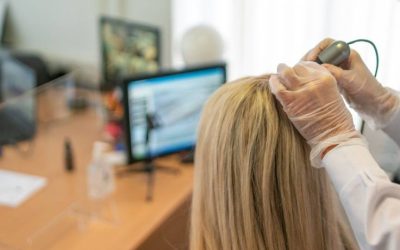Do you experience scalp itching often? Itching accompanied by white flakes are tell-tale signs of dandruff.
While it is perceived to be generally harmless, having dandruff can be unpleasant, especially when the itching becomes non-stop or when the need to scratch surfaces while you are at a gathering. Moreover, having flakes on your hair or shoulders can be humiliating.
Dandruff affects both men and women, although men are more prone to have it. It may develop at any age, even during infancy. Babies develop dandruff which presents as yellow, oily and scaly patches on their scalp. People with health conditions like HIV or Parkinson’s disease are more susceptible to develop this condition. Those with oily skin are also at a higher risk of suffering from dandruff. Lastly, this scalp problem typically worsens during fall and winter months.
What Makes the Scalp Itch?
Poor hygiene, specifically not shampooing your head enough, is one of the culprits behind dandruff. Skin cells on your scalp may accumulate and result in a scratchy and flaky scalp. Meanwhile, using certain hair and scalp care products like hair sprays and dyes may cause contact dermatitis, a type of eczema. This condition leads to an irritated, red and dry scalp. Sometimes, blisters and cracks may also appear.
One of the most common causes of a scratchy scalp is seborrheic dermatitis. This condition is characterised by an irritated and oily scalp. Seborrheic dermatitis may be due to the overgrowth of Malasezzia, a type of fungus, or the overproduction of oil in the scalp. Basically, the excessive amount of oil in the scalp results in irritation, reddening, itching and skin cell accumulation.
Aside from Malasezzia, dermatophytes, another type of fungus, cause a scalp problem called tinea capitis, popularly known as ringworm of the scalp. Itchy, circular red patches of hair loss are the most common symptoms of this condition.
Persistent scalp itching accompanied by whitish-silver scales may be due to scalp psoriasis. Believed to be an autoimmune problem, scalp psoriasis is the result of the overproduction of skin cells at a rapid rate. Since old skin cells do not have time to fall off, the new ones pile up over the old ones creating a build-up of whitish-silver scales.
How to Prevent or Stop Scalp Itching
A good way to relieve scalp itching and stop dandruff is to use shampoos formulated to address dandruff. For best results, ask your dermatologist which anti-dandruff shampoo you should use. Meanwhile, if the itching is due to dryness, keeping the scalp moisturised can help alleviate the itching. Keep in mind, before applying anything on your scalp, make sure that you consult a hair and scalp specialist to ensure that the product you intend to use is safe and appropriate.
Always keeping your hair clean is another way of stopping scalp itching or dandruff. Frequent washing of hair is highly recommended, especially if you use hair styling products. This is to get rid of substances which can harm your scalp and hair. Washing your hair often also prevents the build-up of oil which usually promotes dandruff growth.
If you are suffering from dandruff, it is also best to avoid using too many hair products as this can exacerbate the itching. As much as possible, eliminate those you do not really need, especially if you noticed that they worsen your symptoms.
You must also stop going to bed with a wet hair as this can promote the growth of Malassezia. Similarly, frequent use of hats or caps can create a warm, humid environment on your scalp which is conducive for dandruff-causing microbes. So, limit your use of hats or caps.
It is also imperative that you avoid scratching affected areas. Itching is sometimes due to irritation. Scratching the irritated area may aggravate the irritation and lead to more itching. It is also important that you stay relaxed. Being under constant stress can worsen your dandruff. Why? When you are stressed out, your immune system becomes weak thereby making it easier for dandruff-causing fungi like Malassezia to thrive.
If anti-dandruff shampoos do not work, talk to your dermatologist. Moreover, see your doctor right away if the itching becomes intense and redness is observed in other body parts.
Are you suffering from an itchy scalp? If you want to know what it means, call us at (0)1 6793618 and schedule an appointment with our hair and scalp specialist.
—
Photo by ierdnall




